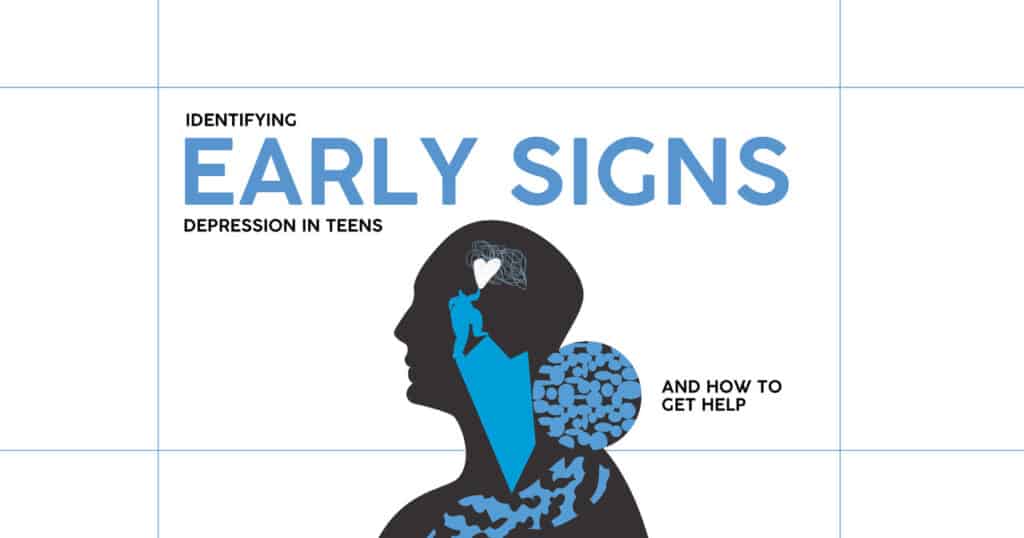Understanding Teen Depression
- Early Recognition is Key: Identifying early symptoms of depression, such as changes in behavior, emotional symptoms, and physical complaints, can lead to timely intervention and support.
- Seek Professional Help: If you suspect your teen is struggling with depression, don’t hesitate to reach out to mental health professionals. Therapy, medication, and support systems can be crucial in their recovery.
- Support Healthy Habits: Encourage your teen to adopt healthy routines, such as regular physical activity, balanced nutrition, and positive social interactions, to support their mental health and resilience.
The teenage years can be particularly challenging, making it crucial for parents, educators, and caregivers to be vigilant in identifying early signs of depression. This comprehensive guide will help you understand teen depression, recognize its early signs, and find the proper support for your child.
Understanding Teen Depression
What is Depression?
Depression is more than just feeling sad or having a bad day. It’s a complex mental health disorder that affects a person’s mood, thoughts, and behavior. In teenagers, depression might not always look like what you’d expect. While adults might express their feelings through words or behavior, teens might show their struggles through changes in their behavior, attitudes, and even physical symptoms.
Teen depression can manifest in various ways. For some, it might be a persistent feeling of sadness or emptiness. For others, it could be irritability or mood swings. It’s essential to recognize that depression in teens might not always be apparent and can sometimes be mistaken for typical teenage angst or rebellious behavior.
Causes and Risk Factors
Understanding what might lead to depression in teens is critical to recognizing it early. Depression is often caused by a combination of factors rather than a single event. These factors include:
- Genetics: A family history of depression or other mental health conditions can increase a teen’s risk of developing depression.
- Environmental Factors: Stressful life events, such as the death of a loved one, parental divorce, bullying, or sexual abuse, can contribute to the onset of depression.
- Social Influences: Peer pressure, social media, and the pressure to excel academically or socially can also play a significant role.
Teenagers are at a vulnerable stage in their development, and these factors can interact in complex ways to affect their mental health.
Recognizing Early Signs of Depression in Teens
Behavioral Changes
One of the first signs of depression in teens can be noticeable behavior changes. This can include:
- Withdrawal from Social Activities: A teen who once enjoyed spending time with friends or participating in activities may suddenly lose interest and isolate themselves.
- Changes in Academic Performance: A drop in grades or a lack of motivation to complete schoolwork can be a red flag.
- Altered Sleep Patterns: Insomnia, excessive sleeping, or frequent nightmares can indicate that something is amiss.
For instance, a teen who was previously outgoing and involved in sports may suddenly refuse to participate in their favorite activities and spend long hours alone in their room.
Emotional and Psychological Indicators
Emotional and psychological symptoms of depression can be subtle but are crucial to recognize. These include:
- Persistent Sadness: If your teen seems sad or down most of the time, it could be more than a passing mood.
- Irritability and Mood Swings: Frequent outbursts or sudden mood changes might indicate underlying emotional distress.
- Feelings of Worthlessness or Hopelessness: The feeling that they are not good enough or that nothing will ever improve are severe signs of depression.
It’s not uncommon for teens to have mood swings, but persistent feelings of worthlessness or hopelessness should be taken seriously.
Physical Symptoms
Depression can also manifest through physical symptoms that might not be immediately connected to mental health. These can include:
- Changes in Appetite: A sudden increase or decrease in appetite or noticeable weight changes can be a sign of depression.
- Unexplained Aches and Pains: Persistent physical complaints like headaches or stomachaches with no apparent cause might be related to emotional distress.
- Fatigue: Constant tiredness or lack of energy, even after adequate sleep, can indicate depression.
For example, a teen who frequently complains of stomachaches or headaches, despite medical tests showing no physical issues, might be experiencing psychological distress.
The Impact of Ignoring Symptoms
Long-Term Consequences
Ignoring the symptoms of depression can have severe long-term consequences. Untreated depression can affect a teenager’s overall development and well-being, leading to:
- Academic Struggles: Persistent depression can impact a teen’s ability to focus and perform well in school, affecting their future educational and career opportunities.
- Relationship Issues: Depression can strain relationships with family and friends, leading to isolation and social difficulties.
- Increased Risk of Substance Abuse: Teens with untreated depression are at a higher risk of turning to alcohol or drugs as a coping mechanism.
According to the National Institute of Mental Health, about 60% of teens with untreated depression will experience further mental health issues or substance abuse problems in adulthood.
How Depression Affects Daily Life
Depression interferes with daily functioning, which might include:
- Difficulty in Social Situations: Teens might find it hard to engage in social activities or maintain friendships.
- Impact on Family Dynamics: Family relationships might suffer, causing tension and conflict at home.
- Disruption of Daily Routines: Depression can make it challenging for teens to keep up with responsibilities like schoolwork and personal hygiene.
A previously active teen may begin to withdraw and show little interest in family or friends, leading to misunderstandings and additional stress within the family unit.
Seeking Help and Support
Talking to Your Teen
Initiating a conversation about mental health with your teen can be daunting but is crucial. Here are some tips for approaching the conversation:
- Create a Safe Environment: Choose a comfortable and private setting where your teen feels safe to express their feelings.
- Be Supportive and Non-Judgmental: Approach the conversation empathetically and avoid criticizing or judging their feelings.
- Listen Actively: Show that you are listening by reflecting on what they say and acknowledging their emotions.
Instead of saying, “You’re just being dramatic,” try, “I’ve noticed you’ve been down lately. Can we talk about what’s going on?”
Professional Help
If your teen shows signs of depression, seeking professional help is essential. Different types of mental health professionals can offer support:
- Therapists and Counselors: They provide psychological therapy, such as behavioral therapy or cognitive-behavioral therapy, to help teens explore their feelings and develop coping strategies.
- Psychiatrists: They can diagnose mental health conditions and prescribe medications if necessary.
- School Counselors: Many schools have counselors who can offer support and resources for struggling students.
Working with a mental health professional to determine the best approach for your teen is essential.
Support Systems and Resources
In addition to professional help, several resources and support systems can be beneficial:
- Support Groups: Provide a space for teens to connect with others facing similar challenges.
- Hotlines: Crisis hotlines offer immediate support for those needing urgent help. The National Suicide Prevention Lifeline (1-800-273-TALK) provides 24/7 support.
- Online Resources: Websites like NAMI and Mental Health America offer valuable information and support.
Encouraging Healthy Habits
Building Resilience and Coping Skills
Helping your teen develop resilience and coping skills can be instrumental in managing depression. Consider these strategies:
- Promote Healthy Routines: Encourage regular physical activity, balanced nutrition, and sufficient sleep.
- Teach Stress Management Techniques:Mindfulness, breathing exercises, or yoga can help manage anxiety and depressive symptoms.
- Encourage Open Communication: Foster an environment where your teen feels comfortable sharing their feelings without fear of judgment.
Conclusion
Addressing early signs of depression in teens is essential for their overall well-being. By understanding the causes, symptoms, and available treatments, you can empower your teen to navigate these challenging years while fostering resilience and emotional strength. Remember, mental health is just as important as physical health, and seeking help is a sign of strength, not weakness.
FAQs
- What are some common signs of depression in teens?
Common signs include withdrawal from social activities, changes in academic performance, persistent sadness, irritability, changes in sleep or appetite, and unexplained physical complaints. - How can I approach my teen about their mental health?
Approach your teen with empathy and understanding. Choose a comfortable setting, listen actively without judgment, and express your concern and support. - What types of professionals can help with teen depression?
Therapists and counselors, psychiatrists, and school counselors can all provide valuable support. - What are some effective ways to support a teen with depression at home?
Promote healthy routines, teach stress management techniques, encourage positive social interactions, and provide a supportive environment. - Where can I find additional resources for teen depression?
Consider resources like NAMI, Mental Health America, crisis hotlines, and support groups. These offer valuable information and support for both teens and their families.




